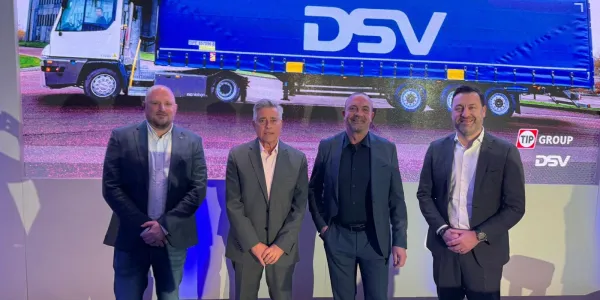Managing your trailer performance through relevant maintenance solutions

Irrespective of whether you operate a large or a small fleet of trailers, maintaining the roadworthiness of a trailer fleet is vital for your business, the environment, and the driver safety.
Maintenance and repair programmes play an important role in ensuring that trailers do not fail in operation with the associated impact on costs, unnecessary downtime, and potential incidents.
Despite the latest advances in trailer technology, component failure is always a possibility. By determining the best maintenance strategy for your trailer fleet, this will realistically prolong and maximise the life of the trailers, whilst enhancing the return on capital investment.
One thing is guaranteed though: the longer a trailer is off the road, the more it’s going to cost your business.
Making the right choice
Choosing the right maintenance strategy is not always a straightforward process.
- Reactive maintenance: repairing your asset when a breakdown has occurred
Reactive maintenance is the most intuitive form of maintenance. As an oversimplification – if something breaks on a trailer whilst out on the road, this can be very costly. In most cases, the driver needs to get to the nearest workshop to maintain or repair the asset, which in turn can unfortunately lead to unnecessary downtime off the road.
- Proactive maintenance: forward thinking approach
Proactive maintenance, also called preventative maintenance, is a maintenance philosophy that aims to avoid failure by addressing conditions that can lead to a breakdown. In other words, proactive maintenance can prevent equipment failures and extend the functional life of your assets. In addition, if you can keep your production lines up and running, you’ll be more profitable as well.
Operators tend to employ a combination of both proactive maintenance and reactive strategies to cover the various elements of a trailer. A reactive maintenance regime will, for example, work effectively on minor components such as bulbs, but less for critical components where the proactive approach to maintenance is more appropriate.
Identifying potential future issues
In simple terms, trailers can be broken down into four key areas of maintenance:
- Trailer chassis/structure: fasteners and frame members, welds, doors, gates and ramps
- Trailer equipment: couplers, safety chains, lights, signals and electrical items
- Trailer components: axles, wheels, and brakes
- Trailer body: depends on the body specification – box, reefer, flatbed, curtainsider etc
By focusing on the functions of these components and mitigating risks with each of these areas within a trailer, operators can identify and put the right maintenance safeguards in place for their fleet.

Making trailer maintenance even more relevant
Operators should consider two further primary factors:
- The true cost of equipment failure
- The ease of monitoring the equipment
The true real-time cost of equipment failure needs to be considered from the outset. One of the major costs associated with equipment failure is, of course, trailer downtime. As mentioned before, the longer a trailer is off the road, the more it’s going to cost.
But downtime isn’t the only factor to consider in overall trailer maintenance costs. Repair expense, safety, and environmental impacts are also concerns that need to be addressed, especially if a given failure mode could potentially result in injury to an employee or others.
Once a maintenance strategy has been implemented, it’s not the end. The second factor to consider when determining a trailer maintenance strategy is the ease of monitoring. Companies need to constantly assess the progress of their chosen approach and make the necessary operational adjustments as the programme develops, if needed.
And this is where the latest advancements in technology have certainly impacted on traditional trailer maintenance practice, for the better.
The development of effective tyre pressure monitoring systems (TPMS) and electronic brake performance monitoring systems (EBPMS), for example, have bridged the gap between reactive and proactive maintenance. These state-of-the-art technologies provide ongoing performance data, literally on a 24/7 basis.
Technological developments for this area of trailer performance present real-time detailed information about the performance of the tyres and brakes. It enables maintenance staff to make informed decisions on potential faults on such critical trailer components, well in advance of any potential failure.

Why is it important to cover all these needs?
It is the operator’s legal obligation to ensure that their trailers only go out on the road in a truly roadworthy condition, according to the laws of the country in which they are working.
The penalties of running a non-compliant trailer fleet can have far reaching consequences not just financially but in terms of trailer prohibition, with a subsequent loss of business. At worst, badly maintained trailers may even cause serious injury or fatalities.
This is why it is beneficial for trailer fleet operators to work closely with an experienced provider, who has both the expertise and experience of running and maintaining fully compliant trailer fleets, not just within its own business, but also handling the varying maintenance requirements of its extensive customer base (and for non-customers) too.
Any time, any place, TIP is there!
With over 50 years’ experience of servicing its own extensive trailer fleet, TIP’s maintenance solutions are designed to give operators maximum flexibility, wherever the trailers are in operation.
Today, the company is servicing its customers from more than 120 locations spread over 18 countries in Europe and Canada, with experts on hand to maintain all asset types, through on-site maintenance and roadside assistance, together with advanced telematics programmes for predictive maintenance.
Talk to the trailer maintenance experts at TIP today: visit the TIP website to see which is the closest TIP workshop to your business.





















